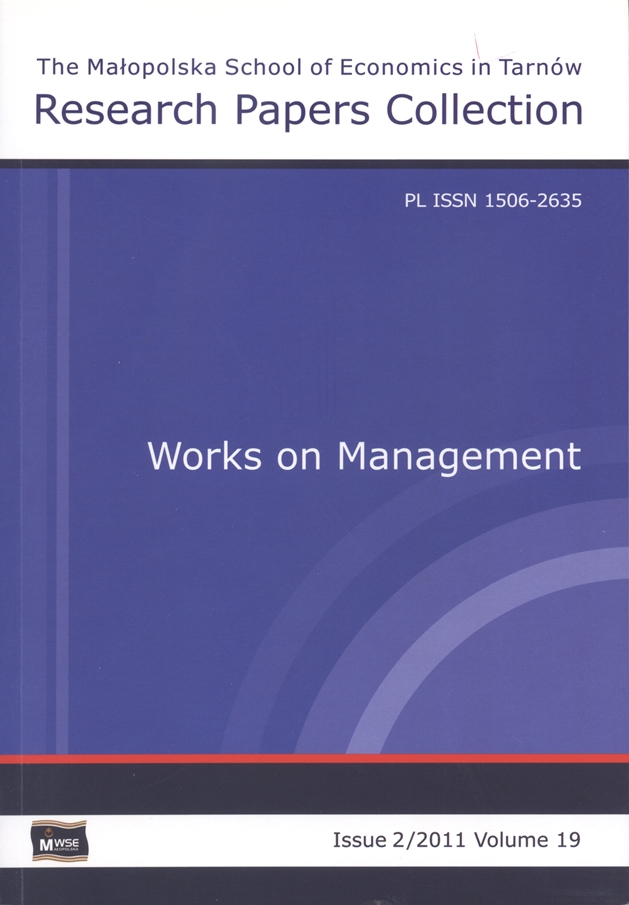Abstract
The theoretical outline of the issues which constitute the essence of corporate governance research is settled in the theories of the new institutional economics. The theory of contracts, the theory of agency, economy of transaction costs and the theory of rights of ownership are presented with the phenomenon of asymmetry of information which appears in various aspects of functioning of a company. The conclusion from the analysis within this paper is the statement that corporate supervision in any company is strongly determined with the specific nature of the activities of all its parties: the hierarchy of their objectives, expectations, competencies, willingness to undertake risk, thus including also stimulation of the level of asymmetry of information, using mechanisms of compensation or motivations used for drawing benefits from using private information.
References
Coase R. H. 1937. “The nature of the firm”. Economica, New Series, vol. 4, no. 16 (November), pp. 386-405.
View in Google Scholar
Coase R. H. 1998. “The new institutional economics”. The American Economic Review, vol. 88, no. 2 (May), pp. 72-74; reprinted in Polish: “Nowa ekonomia instytucjonalna”. Gospodarka Narodowa, no. 3.
View in Google Scholar
Gorynia M. 1995. “O niekonwencjonalnych doktrynach ekonomicznych w polityce transformacji”. Ekonomista, no. 4, p. 668.
View in Google Scholar
Hung H. 1998. “A typology of the theories of the roles of governing boards”. Corporate Governance, vol. 6, no. 2. Quoted in: S. Rudolf, T. Janusz, D. Stos, P. Urbanek, Efektywny nadzór korporacyjny: Teoria i praktyka. Warszawa: Polskie Wydawnictwo Ekonomiczne, 2002.
View in Google Scholar
Kozioł L. 2007. “Instytucjonalne problemy ładu korporacyjnego w spółkach kapitałowych sektora publicznego”. Zeszyty Naukowe Małopolskiej Wyższej Szkoły Ekonomicznej w Tarnowie, no. 1 (10), pp. 215-230.
View in Google Scholar
Kozioł L., Zych W. 2009. “Analiza instytucji nadzoru właścicielskiego w spółkach”. Zeszyty Naukowe Małopolskiej Wyższej Szkoły Ekonomicznej w Tarnowie, vol. 2, no. 2 (13), pp. 181-193.
View in Google Scholar
Laffont J. J. 1995. The economics of uncertainty and information. Cambridge MA: Massachusetts Institute of Technology Press. ISBN 0262121360.
View in Google Scholar
Letza S., Xiuping S. 2002. “Corporate governance: Paradigms, dilemmas and beyond”. Poznań University of Economics Review, vol. 2, no. 1.
View in Google Scholar
Marschak J. 1950. “The rationale for the demand for money and of ‘money illusion’”. Metroeconomica, vol. 2, iss. 2 (June), pp. 71-100.
View in Google Scholar
Martens B. 2004. The cognitive mechanics of economic development and institutional change. London and New York: Routledge. ISBN 0-415-32633-8.
View in Google Scholar
Putterman L. 1993. “Ownership and the nature of the firm”. Journal of Comparative Economics, vol. 17, iss. 2 (June), pp. 243-263.
View in Google Scholar
Stiglitz J. E. 1987. “Principal and agent”. In: The new Palgrave: A dictionary of economics. Ed. J. Eatwell, M. Milgate, P. Newman. London: Macmillan. ISBN 0333372352.
View in Google Scholar
Williamson O. E. 1998. Ekonomiczne instytucje kapitalizmu: Firmy, rynki, relacje kontraktowe. Transl. by J. Kropiwnicki. Warszawa: Wydawnictwo Naukowe PWN. ISBN 83-01-12392-3.
View in Google Scholar
© Copyright by Małopolska School of Economics in Tarnów. The articles are available under the Creative Commons Attribution NonCommercial-NoDerivatives 4.0 International License


